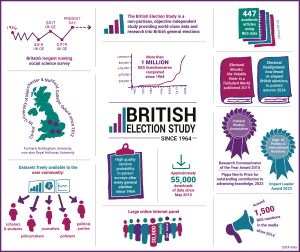The British Election Study (BES) is one of the longest running election studies world-wide and the longest running social science survey in the UK. Now in its 60th year, we look at the contribution the BES makes to the understanding of political attitudes and electoral behaviour in the UK.
Our new ‘BES at a Glance’ Infographic shows some important areas of BES work.
There have been more than 1 million BES questionnaires completed since the BES began in 1964, with high quality probability in-person surveys after every general election.
The current BES team have recorded approximately 55,000 downloads of BES data since 2015 and around 1,500 BES mentions in the media. This year the team will launch a new book, Electoral realignment: How Brexit re-shaped British elections. The book offers an in-depth explanation of realignments and examines the Brexit realignment in over-time context.
Professor Ed Fieldhouse, Director, BES, said:
‘The British Election Study data has been an essential resource for election researchers around every general election since the 1960s and have been used in thousands of academic books and articles. The next general election will be no different: we are already collecting data, which will help researchers shed light on the campaign, the results, and the aftermath.’
Professor Jane Green, Co-Director, BES, said:
‘Today’s politics offers dramatic changes. In these challenging times the British Election Study provides consistent, trusted data and insights. With the next general election likely to take place this year, our internet panel study will provide unparalleled opportunities to understand trends in voters’ attitudes, and behaviours, and the in-person probability post-election study will continue to provide a vital benchmark.’
The BES panel study will cover both the May 2024 local elections, and then the pre-election, campaign, and post-election wave for the next UK general election. The post-election random probability survey will take place in-person in the weeks and months that follow the election.
To stay up to date, please follow @BESResearch and our latest news on the BES website.

